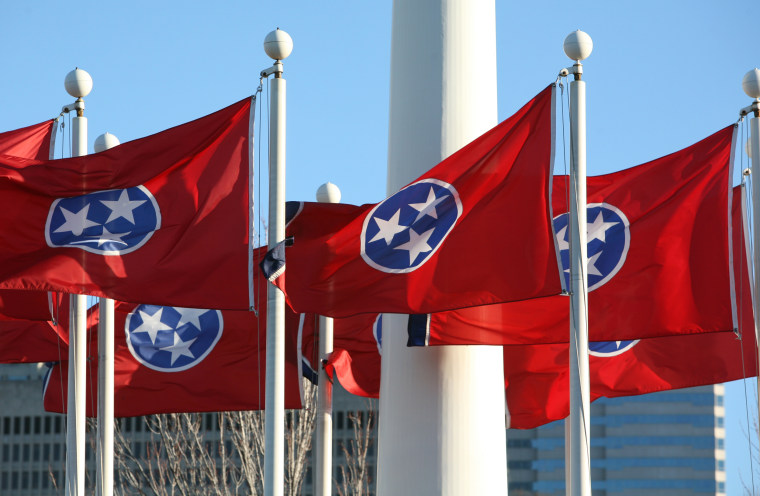What's in a word?
According to a bill passed by lawmakers in the Tennessee Senate Thursday, certain words should only be allowed to have "natural and ordinary" meanings.
In this case, the words in question could be "husband" and "wife."
Tennessee's House Bill 1111 (also known as Senate Bill 1085) has caused quite a bit of controversy for a seemingly slight change to an existing state code.
In layman's terms, the new Tennessee law could make it so that marriage is inadvertently defined as between a man and a woman only — and prevent other currently evolving definitions of gender from being permissible.
Related: HB2 Repeal: North Carolina Overturns Controversial ‘Bathroom Bill’
H.B. 1111 refers sweepingly to "undefined words," and tries to limit the way those words could be interpreted.
"Undefined words shall be given their natural and ordinary meaning," the law reads. "Without forced or subtle construction that would limit or extend the meaning of the language, except when a contrary intention is clearly manifest."
The bill, however, doesn't actually define what "undefined words" are.
"Undefined words shall be given their natural and ordinary meaning."
As a result, LGBT advocacy groups like the Tennessee Equality Project are calling it a "sneaky" law with the sole purpose of "LGBT erasure."
And they aren't alone in their concerns. In a detailed April 13 opinion, Tennessee Attorney General Herbert Slatery, a Republican, wrote that the proposed law's strict interpretation of words like "husband" and "wife" could create a challenge to same-sex marriage.
Specifically, Slatery referred to the U.S. Supreme Court's 2015 decision in Obergefell v. Hodges that made marriage for same-sex couples the law of the land.
"Statutes that are related to marriage or to the terms, conditions, benefits, or obligations of marriage could, in some instances, be in conflict with the holding in Obergefell if gender-specific words in those statutes were construed according to the proposed legislation," said Slatery in the opinion.
Slatery did not immediately respond to a request for comment.
The Tennessee Equality Project, founded in 2004 to fight discriminatory state policy, also warned against the bill.
"The attorney general noted potential conflicts with existing law in his recent opinion. Those conflicts could cause judicial confusion and discrimination against LGBTQ people in Tennessee," said Tennessee Equality Project spokesperson Chris Sanders.
Sanders said the bill "makes Tennessee a target for national economic boycotts," and added that Tennessee Equality Project was urging Gov. Bill Haslim to veto the bill.
Related: North Carolina Lawmakers Announce Deal to Repeal 'Bathroom Bill'
Haslim's press secretary Jennifer Donnals told NBC News that the governor plans to "review the bill in its final form before taking any action."
The national LGBT advocacy group GLAAD also urged Haslim not to follow the lead of states like North Carolina, which was hit with boycotts and massive economic losses after the March 2016 passage of the controversial law known as HB 2.
“With the entire nation watching, Gov. Haslam should veto this bill," GLAAD president Sarah Kate Ellis said.
Ellis said the Tennessee law is "not only bad for business, but would set a dangerous precedent that could place the well-being of LGBTQ Tennesseans in jeopardy."
Rep. Andrew Farmer, the bill's Republican sponsor, told NBC News that it "would not be the first time the legislature has weighed in on statutory interpretation." He said the bill's language largely draws from existing Tennessee law and state Supreme Court cases.
"This has nothing to do with same sex marriage or gender," he told NBC News in an email.
The "natural and ordinary meaning" bill is one of three pieces of Tennessee legislation under scrutiny by LGBT advocates.
Related: Transgender Bathroom Bill Fails in Tennessee Legislature
The state's House Bill 33 would require that words like "father" and "mother" be "based on the biological distinctions between men and women" — which GLAAD said could impact transgender people's rights as well as same-sex parents raising children together.
Tennessee's House Bill 1406, also criticized by GLAAD, repeals a law that defines a child born through artificial insemination to be "legitimate." That law would impact LGBTQ parents, single parents, and straight couples with fertility problems.
At Thursday's Senate vote in Tennessee, Republican State Sen. Richard Briggs of Knoxville said that House Bill 1111's strict interpretation of words is about LGBT couples after all.
"We may not like some of the things we see, and we may not like the way that things are being defined these days," Briggs said. "But I think at some point, we're going to have to go back and write a whole new section of law that's dealing with these complex issues when you have same-sex couples."
On the Tennessee Senate floor Thursday, Briggs said it's important to "define better" what "parental rights mean when you have, maybe a natural mother and a not natural other parent. And the same could be said for fathers."
